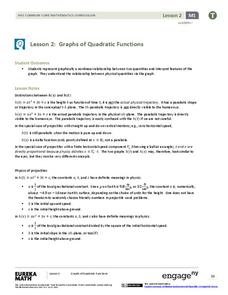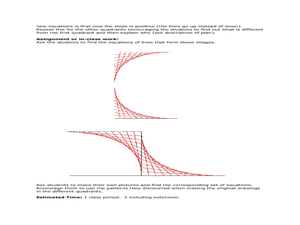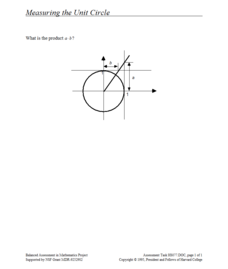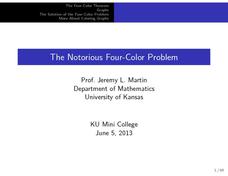EngageNY
Graphs of Quadratic Functions
How high is too high for a belly flop? Learners analyze data to model the world record belly flop using a quadratic equation. They create a graph and analyze the key features and apply them to the context of the video.
Curated OER
Choosing a College
How can mathematics help scholars choose a college? High schoolers learn how they can use decision matrices to rank colleges based on selected criteria. They also see how to weigh criteria using multiplication of the decision matrix by a...
Curated OER
Changing It Up
How should a cashier stock a cash register with coins? Learners use mathematical modeling and expected value to determine how many rolls of coins of each type they should place in a cash register.
Curated OER
A Rectangle in the Coordinate Plane
A quadrilateral is drawn on the coordinate plane, and eighth grade geometers find the length of each side and the diagonals by applying the Pythagorean theorem.
Curated OER
Measuring the Earth
High schoolers use principles of geometry to measure the circumference of the Earth. In this applied geometry lesson, students use mathematics to determine scientific information. They make measurements, calculate the central angle, and...
Curated OER
Distributive Property
For this distributive property worksheet, students solve and complete 22 different equations that include applying the distributive property to each one. First, they simplify each expression listed by applying the distributive property....
Curated OER
Slopes for the Mathematically Inclined
In this slope activity, 9th graders solve and complete 6 different problems that include completing charts and applying applications to the real world. First, they use the pictures shown to measure the riser and tread of 3 consecutive...
National Wildlife Federation
What is DBH?
When measuring the circumference of a tree, does it matter how high you place the measuring tape? Most scholars have never considered this question, but scientists know that measurement techniques must be standardized. The 13th...
Curated OER
Solving Linear Equations
In this solving linear equations worksheet, 9th graders solve and complete 6 different types of problems. First, they maintain a balance on both sides of the equation so that each side remains equal. Then, students apply mathematical...
Curated OER
Mathematics of Doodles
Students use the slope and y-intercept to graph lines. In this algebra lesson, students graph linear equations and apply it to solving real life problems.
Radford University
Parallel Lines, Transversals, and Angles: What’s the Connection?
Streets, bridges, and intersections, oh my! Parallel lines and transversals are a present in the world around us. Learners begin by discovering the relationship of the angles formed by parallel lines and a transversal. They then apply...
Illustrative Mathematics
Area of a Trapezoid
Here is a straightforward example of how to apply the Pythagorean Theorem to find an unknown side-length of a trapezoid. Commentary gives additional information on proving that the inside of the trapezoid is a rectangle, but is...
Willow Tree
Multiplying and Dividing Monomials
Apply the power of mathematics to the power expressions. The lesson gives examples of expressions that utilize each of the exponent rules to simplify. Once seeing the exponent rules individually, scholars combine them to simplify an...
Balanced Assessment
Multi-Figures
Apply concepts of scale and ratio to determine relationships in irregular figures. Learners determine the ratio of the perimeters of two figures composed of rectangles and circles. After, they apply similar concepts to find the ratio of...
Concord Consortium
Measuring the Unit Circle
Here's the right task to investigate right triangles in the unit circle. A short performance task has learners determine the product of two side lengths in a unit circle. They must apply similarity concepts and trigonometric ratios to...
Curated OER
The Notorious Four-Color Problem
Take a walk through time, 1852 to 2005, following the mathematical history, development, and solution of the Four-Color Theorem. Learners take on the role of cartographers to study a United States map that is to be colored. One rule: no...
Illustrative Mathematics
The Lighthouse Problem
Long considered the symbol of safe harbor and steadfast waiting, the lighthouse gets a mathematical treatment. The straightforward question of distance to the horizon is carefully presented, followed by a look into the different...
Balanced Assessment
Number Game
It's all in the numbers! Create a mathematical model to analyze a number game and develop a winning strategy. Using a given numerical pattern, scholars write an expression to model the scenario. They then interpret the pattern of the...
Balanced Assessment
Bicycle Chain II
Apply geometric concepts to a design problem. Individuals examine the structural setup of the chain on a bicycle and use the measurements of the circles to determine the length of the chain.
Concord Consortium
Two Pounds to Go
How hard can it be to measure out two pounds? A short performance task introduces a situation where a balance scale is broken. It gives a method for measuring out two pounds and asks learners to evaluate the procedure. They must prove...
Curated OER
Order of Operations and Two-Step Equations
Solve two-step equations using order of operation in this algebra instructional activity. Young mathematicians evaluate functions through substitution and apply the properties of exponents and negatives correctly. They complete the order...
Curated OER
Pedal Power
Employ proportional reasoning and algebraic understanding to a determine a real world math quandary. Intel has created a project based unit to engage learners in using algebra to describe the physical world. They will create equations,...
Mathed Up!
Direct and Inverse Proportionality
Direct your young mathematicians to a resource on direct and inverse variation. A video first reviews concepts on direct and inverse proportionality. Individuals then answer a set of questions in pure and applied mathematics involving...
Curated OER
Mathematical Magazines
Learners use ads from magazines to create data to be measured and apply the skill of estimation. They record the percentage of magazine ads that could be separated into different categories made by students through the use of logical...

























